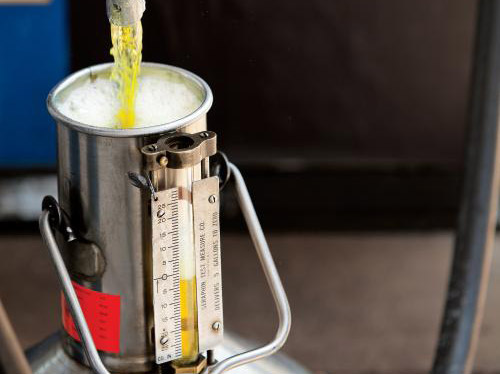Home > Illinois > Illinois Farm to Table > Weights and Measures Inspectors Assure Accuracy for Consumers
Weights and Measures Inspectors Assure Accuracy for Consumers

Whenever you buy lunchmeat at a supermarket deli, the Illinois Department of Agriculture’s Bureau of Weights and Measures makes sure you get exactly what you pay for. The same holds true at the gas pumps.
“Our bureau of 26 field members and four office staffers inspect 134,000 weights and measurement devices each year, including all scales ranging from those found on delicatessen counters to the huge weigh-station scales that police use on the interstates for large trucks,” says Doug Rathbun, chief of the IDOA Bureau of Weights and Measures. “We also check gas pumps to make sure that when a customer pumps 15 or 20 gallons into their vehicle, they get precisely 15 or 20 gallons. By law, the bureau is required to inspect every scale and gas pump in Illinois at least once every year.”
Rathbun says stores and gas stations are not given any advance warning when they are about to be inspected. “We just show up,” he says. “The businesses are expected to always dispense the correct amount of fuel, or weigh their commodities appropriately. If not, they face hefty fines and potential closure.”
Mike Rockford, state metrologist for the Bureau of Weights and Measures, oversees the Standards Laboratory in Springfield where the exact calibrations for mass (weight) and volume (measures) are set. “Not only do we make sure that the customer is getting what they pay for, but we also protect the people selling the products, making sure they aren’t giving away too much,” he says.
Exact Measurements
Rockford says calibrations for weights at the Standards Laboratory range from 5,000 pounds to 1 milligram, while calculations for volume range from 500 gallons to 1 gallon.
“For example, we have precise one-pound weights that we give our field staff. They will enter a grocery store, place that one-pound weight onto a deli scale, observe the digital readout from the scale, and make sure customers are indeed getting one pound of turkey, ham or corned beef when they order,” he says. “Grain elevators, asphalt plants, livestock auctions – wherever there are public scales, our bureau checks them.”
Rockford says the bureau also performs official weigh-ins that take place at the Illinois State Fair. “That’s so the fair can categorize all the animals into appropriate weight classes prior to judging,” he says. “The cows we document vary in weight from 1,000 to about 1,800 pounds, and we also weigh every lamb, sheep and hog that will be entered into competition.”
Detecting the Unexpected
Rockford adds that the precision scales in the Standards Laboratory are so sensitive that they have actually picked up vibrations from far-away earthquakes and major weather disturbances.
“Our bigger scales, called mass comparators, detected a tsunami in Indonesia as it was happening in 2009, plus we received readouts as an earthquake was occurring in Baja California in 2010,” he says. “We have access to amazing advanced equipment here at the Bureau of Weights and Measures.”




Where does one report a malfunctioning gas pump?
https://agr.illinois.gov/consumers/weightsmeasures.html